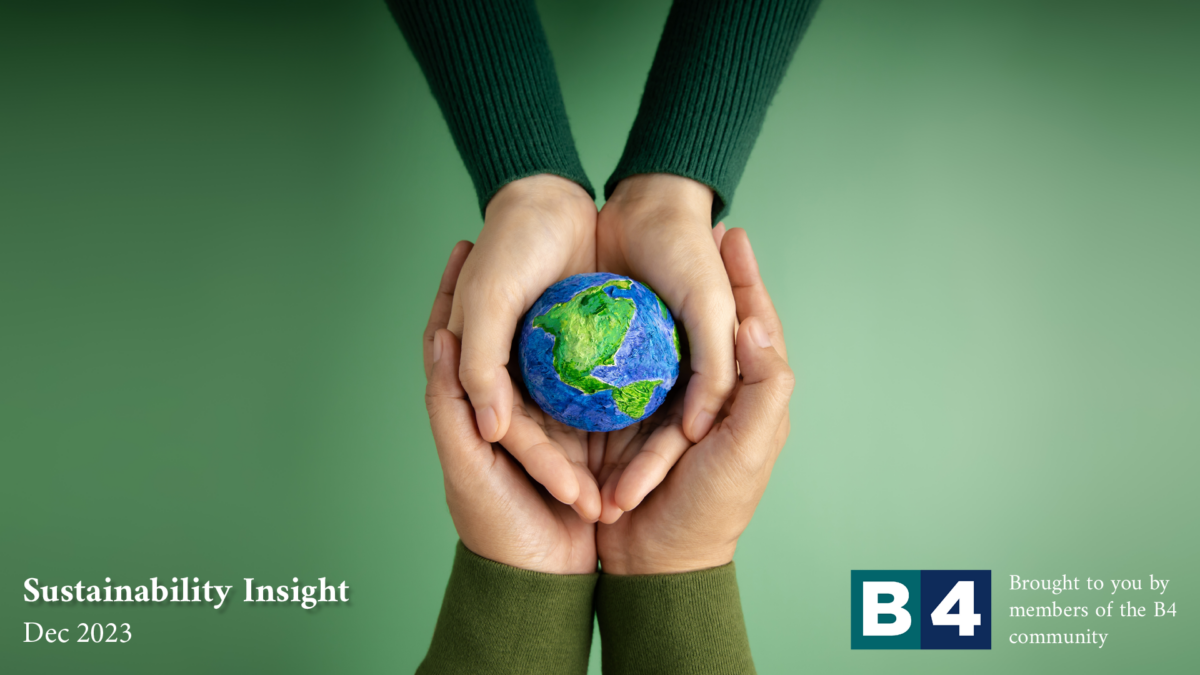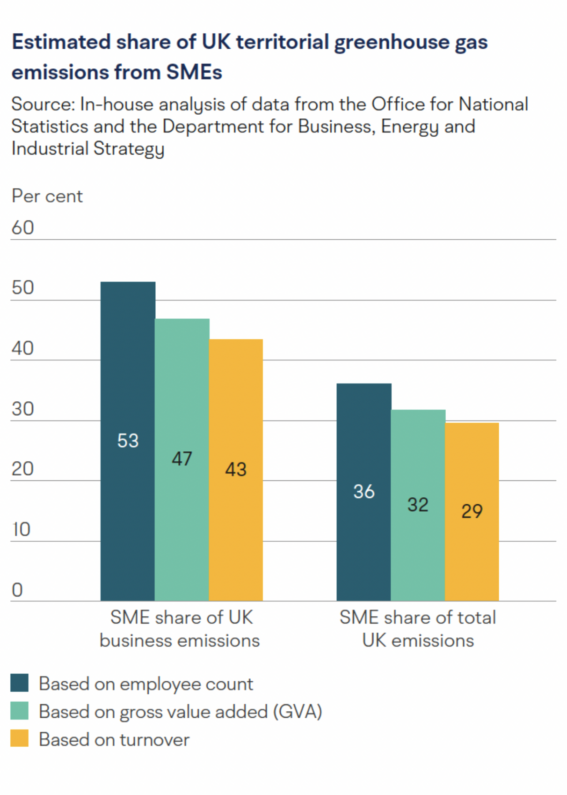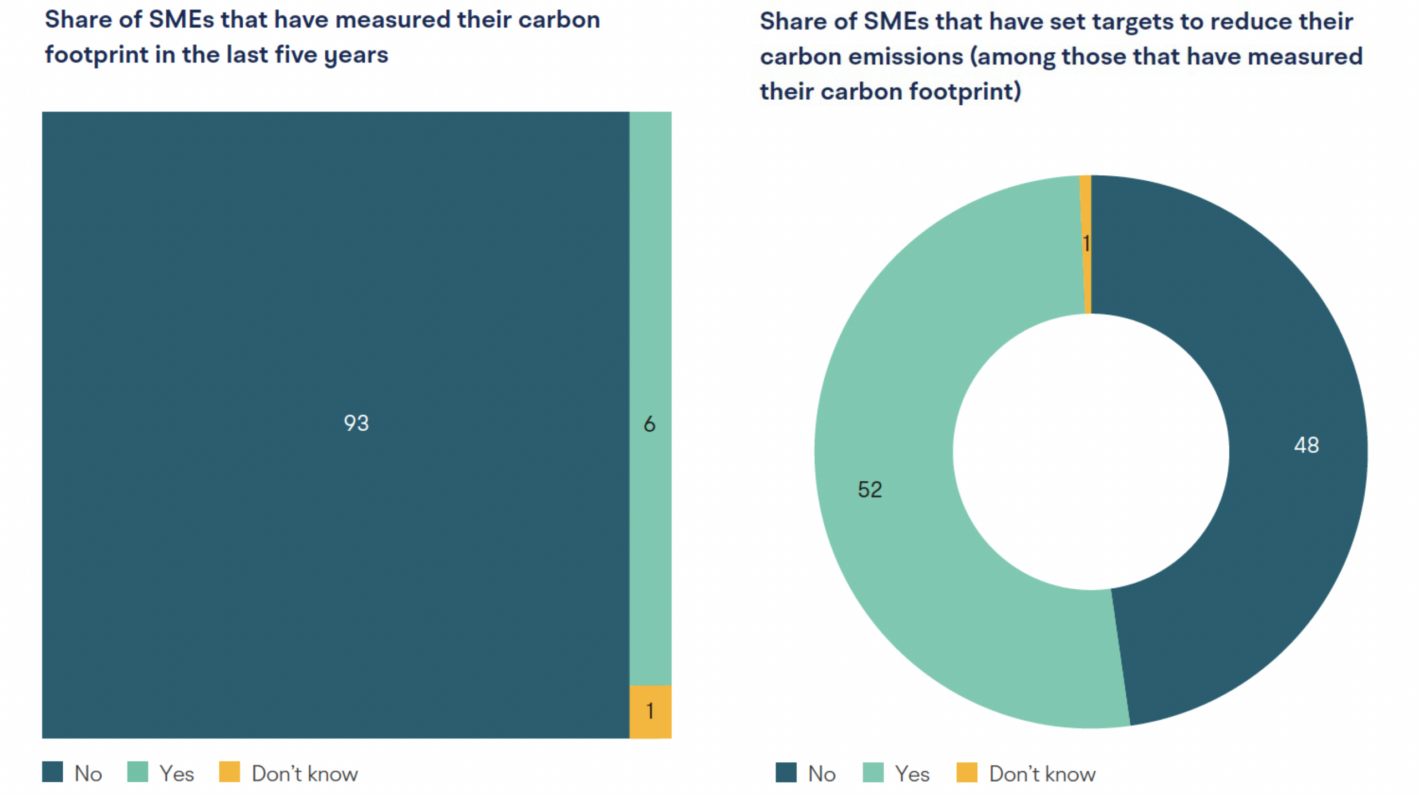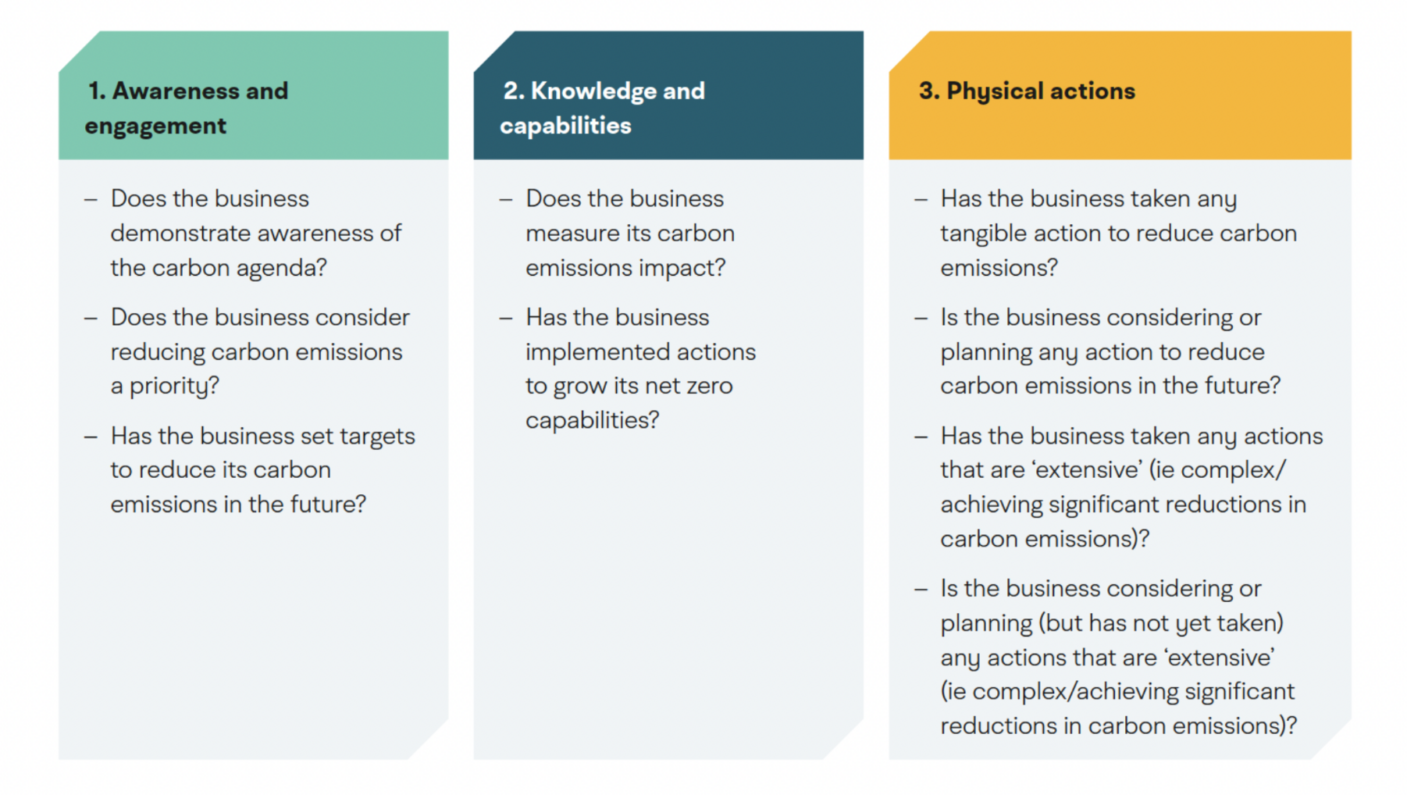
Sustainability in business: from ambition to action
At October’s B4 Sustainability Ecosystem members were unanimous that attaining net zero carbon emissions by 2050 was an important target in our drive to reduce our carbon footprint, address climate change and implement a sustainable business approach. However, while the environmental and social aspirations to ‘be better’ and ‘do good’ were clear, many did not know what the carbon footprint of their business was or felt unsure what the steps should be to convert strategy into direct actions. As session lead Toby Newman from environment consultants, Enistic, explained: “If it can’t be measured, it can’t be improved.”
In the first of our new bi-monthly insights, we look at what the barriers are to sustainable progress, the ‘easy wins’ that we can all achieve and how some of our members are making a positive impact.
The sustainability challenge
In 2019, the Government committed to a 100% reduction of greenhouse gas emissions by 2050 – the net zero target – specifying that any emissions would need to be balanced by schemes to offset an equivalent amount of greenhouse gases such as planting trees or using technology like carbon capture and storage.
The B4 ecosystem snapshot of views is reflective of the position of most UK businesses. Ernst & Young data from April 2023 shows that 80% of UK listed firms say they are committed to becoming net zero by 2050, but the majority (95%) have not yet publicly disclosed detailed, actionable transition plans. Similarly, for small and medium-sized enterprises (SMEs), Enistic research shows that 76% of these companies are fully aware of the target but have not yet made any tangible actions.
Understanding your impact
For Toby Newman at Enistic the biggest barrier to businesses implementing sustainability policies is lack of knowledge about what their carbon footprint is or what they can do about it. There’s also no one-size fits all approach: “The path to net zero does not look the same for all smaller businesses,” explains Toby. “The type of actions to be taken, their sequencing,
and the capabilities required can be very different.
“Businesses need to look at three scopes when measuring their carbon impact: direct and indirect energy usage and their supply chain. But most don’t know where to get this data. Coming up with sustainable solutions can also create other issues. For example, most businesses energy usage is around commuting so the policy should be remote first, but this has to be balanced with employee wellbeing.”
Community and employee engagement
There’s also the matter of how we bring people with us on our sustainability journey – something that Blenheim has experienced in its plans to build a solar farm on its land and the opposition it has felt from the local community. Speaking at B4’s Platinum Breakfast this summer, CEO Dominic Hare said: “For places like Blenheim, carbon zero isn’t hard. So, we set a different goal – to ‘weaponise’ every acre of the Blenheim Estate in the cause of furiously reversing climate change.
“Working with great local allies, the world, as they say, was our oyster. It felt meaningful. Until we dropped the solar farm bomb. It is vital that we use some of our acres to provide clean energy for every home in Oxfordshire. But at what cost?
“I have to find allies not just from the willing (there are some) but also from the furious. I might find a road map that might work for other estates too. I might persuade people to be proud of the future they co-created with us.”
Employee engagement is equally important. As Darren Aston of office supplies firm Aston & James points out: “Sustainability can often be driven by just a few people, but everyone has to be on the same page for it to work.”
Legislation and regulation
Currently large businesses must report their energy use to the Government, and while there are no specific targets for SMEs to meet net zero, new rules are being introduced that will affect them. Legislation has already been introduced banning a range of single-use plastic items, the NHS is aiming to be net zero by 2040, which will extend out to its supply chain, and locally Oxford is planning a much larger zero emission zone (ZEZ) subject to public consultation that could cover most of Oxford City Centre. B4 members at the ecosystem felt that Government could do more, particularly around providing the infrastructure to support sustainable projects and around proactive policies to encourage alternative energy use.
The importance of SMEs
Smaller businesses account for around half of industrial emissions in the UK, according to Enistic data — the same amount as larger businesses — which collectively makes them key players in our drive to becoming more sustainable. However, many of these companies have not measured their carbon footprint and just over half have set targets to reduce their carbon emissions in the last five years. While there is still a long way to go for some, embedding a culture of change can happen quickly in smaller organisations who have both the agility and a level of personalisation that makes it easier for them to implement actions and to bring their employees with them on their sustainable journey.


At a more granular level, research from the Plunkett Foundation charity highlights the strong motivation among community businesses to undertake Energy Saving Measures (ESMs) at their premises. In its Community Ownership: A Better Form of Business report, released in October 2023, it found that 85% of community businesses responding to its survey have either installed or are currently considering installing energy saving measures. The most common ESMs introduced were insulation/double glazing (20%), solar panels/photovoltaics (PV) (18%) and more efficient equipment and better controls of heating and hot water (both 16%). The barriers to installation were mainly due to the difficulties of their location, often rural, and the age of their building at 43%, closely followed by a lack of resources (39%). Having the funds and infrastructure to make changes is clearly an issue, but the charity is supporting its members to localise their supply chain, making them more resilient and sustainable at the same time.
First steps
For B4 members who have already made numerous efforts to reduce their carbon emissions, the advice is that it is not as difficult as you think to take those first steps. There are several physical actions that businesses can take from switching to a green energy supplier, installing Electric Vehicle charging points and using LED lighting. This is what Jarl Severn, CEO at medical device company Owen Mumford calls his ‘easy wins’ – immediate actions you can take to make a difference.
Toby Newman at Enistic describes the sustainable journey as a three-step process: creating awareness and engagement within the business, gaining the necessary knowledge to understand what can be done and making tangible actions. But it comes with a warning: “Most businesses have a strategy, but no policy,” says Toby. “We have to be careful not to fall into the trap of pledging rather than acting.”

Customer-driven change
“Our clients are asking us to be more sustainable,” says Matt Fisher of wealth management firm RBC Brewin Dolphin. “That was not the case 10 years ago.” While there is a slow drip of regulation coming from the Government, the other force driving sustainable change is our customers. Whether that is from large public sector organisations like the NHS who are making Environmental-Social-Governance (ESG) credentials a fixture of its tenders or everyday consumers who are purchasing locally sourced products from their supermarket – the clamour for businesses to be eco-friendly is getting louder.
Aston & James is in the process of working towards B-Corp Certification – an accreditation for companies who meet ‘high standards of social and environmental performance, transparency and accountability’. ‘Our customers are asking for this,” says Darren. “We discussed how we could make improvements internally and then used the B-Corp impact assessment tool as a way of looking at what we could do after we heard about it at a B4 event.
“So far, we’ve changed our lighting, repurposed our packaging and provide green delivery slots.” The company is also helping customers to make more sustainable choices, ranking products higher on its website if they are eco-friendly and encouraging people to order more and less often.
B-Corp certification
Owen Mumford was the first medical device company to receive B-Corp certification in 2021 after formalising its sustainability agenda seven years earlier with the establishment of an environmental steering group. The aim of the group is to conduct and monitor initiatives that support its corporate social responsibility and sustainability objectives. In 2015, it switched to renewable energy at its UK sites which resulted in a significant reduction in its carbon emissions. It has also moved to a paperless system in its finance and human resources departments, installed EV charging points and has started construction on a new centre of excellence in Witney which will adhere to BREEAM (Building Research Establishment Environmental Assessment Methodology) standards.
“It was easy in the first year,” says CEO Jarl Severn. “Tricky in the second year and then it gets harder.” It is currently achieving a 6% year on year reduction of carbon emissions and its aim for the future is to reach net zero by 2045 by continuing to invest in sustainability, working with its customers and all its employees so its efforts can be realised.
Daylesford also recently achieved certification in March 2023 after beginning to examine its impact in 2020, using the B-Corp Business Impact Assessment to provide evidence on how it was performing in the five key impact areas: governance, environment, workers, community and customers, answering a total of 554 questions about its practices, policies and progress. Its environmental efforts include organic farming, use of renewable energy from solar panels and biomass boilers, cycle to work schemes for its staff and sourcing 80% of its goods from UK suppliers.
In a message to her customers, Daylesford founder Carole Bamford, offers a hope for the future: “I hope that our B-Corp status inspires more brands to use their business as a force for good. In the four decades I have been part of the environmental movement, I have witnessed so much impactful and innovative change and I look forward to continuing our story within this network of change-makers.”
Sustainability advice and support
From the ecosystem discussion, it is evident that sharing knowledge helps unpick what your business can do to develop and attain its sustainability objectives.
Thanks to Enistic for hosting the sustainability and for permission to use its slides in this insight. If you would like more information about its carbon management platform or to take advantage of a free advice session – open to all B4 members – please contact Silvia Fernandez at Silvia.Fernandez@enistic.com
The websites below also have useful resources for businesses about sustainability:
More in Conference & Events

Blenheim Palace: There is No Palace Like Home
Having visited the stunning ‘Palace of Oz’ for the annual Blenheim Christmas Lights, the ‘There is no Place Like Home’ sign in the Oz-themed Palace was a fitting reminder of how Oxfordshire’s jewel in the crown has supported B4 over the past 20 years as it’s unofficial second home and cornerstone of the B4 Community

FROM LOVER TO BUYER™
Please join us on Tuesday, October 14th, 2-6:30PM at the Royal Suite of St. Pancras Hotel London, concurrent with Frieze London Art Week, for an afternoon tea and social featuring conversations with visionaries at the intersection of art, culture, and business.

Blenheim Palace celebrates 75th anniversary of public opening
Unveiling of the 360 degree all-new Rooftop View platform with broadcaster and design expert Kevin McCloud
Celebrating £12m roof restoration project – echoing the reason behind Blenheim Palace opening to the public in 1950
Recreation iconic queue photograph taken on Palace’s opening day to public 75 years ago
From this author

University of Oxford Vice Chancellor’s Christmas Drinks: A Celebration of Community,...
Sincere thanks to Professor Irene Tracey, Vice Chancellor of the University of Oxford, and Professor Alex Betts, Pro-Vice-Chancellor (External Engagement, Sport, and Community, for the kind invitation to this year’s Christmas Drinks — a truly memorable evening hosted in the spectacular Life and Mind Building, one of the most impressive additions to Oxford’s innovation landscape.

The Customer Test: When Service Fails the Customer
CASE 1: Ovo Energy by B4’s CEO, Richard Rosser

FROM LOVER TO BUYER™
Please join us on Tuesday, October 14th, 2-6:30PM at the Royal Suite of St. Pancras Hotel London, concurrent with Frieze London Art Week, for an afternoon tea and social featuring conversations with visionaries at the intersection of art, culture, and business.


